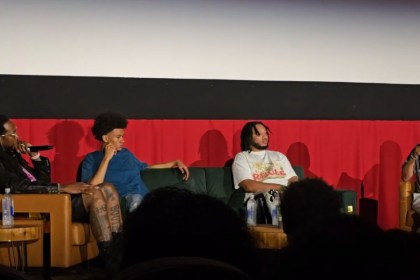
Haitian American filmmaker Rachelle Salnave is beyond happy about 2015. She has every right to be. The Harlem, New York, native will premiere her new documentary on Haiti titled La Belle Vie: The Good Life at the 23rd Pan African Film Festival and the Toronto Black Film Festival 2015.
“When you think of the black experience and black film in Hollywood, that whole journey within itself … to be invited to the Pan African Film Festival that has showcased the African dialogue on film for 23 years is amazing. I am really excited,” Salnave explains.
The Good Life is her second feature-length documentary. Her first was an award-winning film titled Harlem’s Mart 125: The American Dream. It highlighted Harlem’s long-vacant Mart 125 on 125th Street, an indoor market located directly across the street from the historic Apollo Theater. “I used the story of the entrepreneurs to showcase the commercial gentrification of what was going on in Harlem at the time. I am proud of that work,” she vaunts. It won Best Documentary Film at the Africa World Documentary Film Festival in St. Louis.
The Good Life is a story about Salnave’s journey to discover her Haitian roots by examining the complexities of the Haitian society as it pertains to the overall political and economic dichotomy in Haiti. Using her own personal family stories interconnected with capturing the voices of Haitians and experts overall, the film chronologically uncovers the rationale behind its social class system but also how it has affected the Haitian American migration experience as well. With the proliferation of political turmoil, poverty, and now an earthquake-shattered nation.
“My grandparents had a fabulous life in Haiti and they traveled the world,” says Salnave about her decision to focus on Haiti. One family heirloom, a collection of beautiful photos told a story. “The story behind the pictures illustrated the class division in Haiti, the issues of skin color and hair texture — what’s experienced in the black community here as well. When you think of a country like Haiti where we were the first in the world to free ourselves from slavery. Yet we continued the slavery mentality in the ways we treated one another.
“As much as I heard these fabulous stories about the way my grandparent’s lived, I still had a problem as a kid with my Haitian identity because we weren’t respected back in the day. We weren’t respected by the White folks and we certainly weren’t respected by the Black folk because of unknowing and believing what the media portrayed about Haitians,” she reveals. It was tough road as a kid experiencing that. In my documentary, I document the whole journey of identity. I am so in love with my culture and overcame the identity crisis. I am proud of my heritage, my country, my people and where we’re going. I am a complete ambassador.”
If Salnave could change anything in the world relative to Haiti, what would it be?
“We should hone in on our motto: L’Union Fait La Force, which is French for Unity Makes Strength. That phrase is one that is so simple it just rolls off people’s tongues, but to walk that walk is so much harder … if we didn’t think about ourselves individually, but think about Haiti and how to move the country forward with unity. If we did, the laundry list of problems — environment, politics, poverty, classism — would iron themselves out and Haiti would progress,” she envisions.
La Belle Vie: The Good Life beckons all to lay down their arms, be it the tangible weapons of death and pain or the psychological and spiritual tools of division and prejudice, and work as one to rebuild and prosper in the name of a new and stronger Haiti.
The Pan African Film festival is scheduled from Feb. 5-16, 2015; and the Toronto Black Film Festival takes place Feb. 10–15, 2015.







